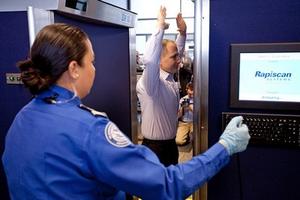AviationDHS debars scanner maker from government contracts
The Transportation Security Administration (TSA) has sent OSI Systems, the manufacturer of airport body scanners, a debarment notice which would prevent the company from receiving government contacts in the future. The notice was sent to the company after TSA determined that the company had failed to address security concerns about its scanners.

OSI System's Rapiscan scanners will no longer be deployed // Source: impactousa.com
The Transportation Security Administration (TSA) has sent OSI Systems, the manufacturer of airport body scanners, a debarment notice which would prevent the company from receiving government contacts in the future. The notice was sent to the company after TSA determined that the company had failed to address security concerns about its scanners.
Law360reports that late last year, OSI received a “show cause” letter from TSA, seeking information about OSI’s Rapiscan Advanced Imaging Technology system and its associated Automated Target Recognition software.
“We continue to believe that, with respect to all issues raised in the show cause letter, we have complied with all obligations and served as a responsible vendor to the TSA,” OSI Systems CEO Deepak Chopra wrote in statement released by the company. “We look forward to having the opportunity to present our views to DHS and working with the agency to achieve a mutually satisfactory outcome.”
TSA stopped using OSI’s body scanners in January because OSI Systems could not update the system to prevent the scanners from showing images of naked travelers. TSA also terminated its contract with OSI, because the company could not develop a system showing images which were less revealing.
OSI noted that the termination was mutually agreed to, and that it would allow the machines to be used for other government agencies.
The fact that TSA was using scanners which showed anatomically correct images of travelers created a backlash against the agency, with lawmakers vowing to pass laws which would ban the use of the machines. Several travelers also sued to government.
In the summer of 2010, the Electronic Privacy Information Center (EPIC) sued the TSA, accusing the agency of violating the Administrative Procedure Act for failing to give public notice before making travelers undergo “whole-body imaging” scans at security checkpoints.
TSA has since begun using scanners made by L-3 Communications, and is currently using 640 generic-image scanners at U.S. airports
EPIC won the case. A D.C. Circuit ruled that the agency should have allowed for public comments to be submitted and considered before requiring passengers to undergo the revealing scans. The judge ordered the agency to initiate a public rulemaking process.
